A steady buzzing sound fills the room. Teacher Mathieu turns the knob carefully until the glass jar starts to vibrate. The loudspeaker is now producing sound at exactly 450 hertz. About 60 first-year students, mainly men, are watching, quiet as mice. Some make snapchat films. ‘Now everybody cover your ears.’ Mathieu turns up the volume and the vibration of the glass increases until it shatters. The students applaud.
Oscillations are today’s topic on this course for first-year students of Electrical engineering at the University of Twente (UT). The lecture is in English, as is the whole Bachelor’s programme. The programme, formerly known as Electrotechniek, made the language switch in 2012. And it is not the only programme; from September 2017 only four of UT’s twenty Bachelor’s programmes will be taught in Dutch.
This puts Twente ahead of Wageningen University & Research, where all but one of the Bachelor’s programmes are largely taught in Dutch. Early in September the executive board presented a plan to change this by introducing six English-taught Bachelor’s programmes from 2018 (see box). Given the similarities between WUR and UT – both small-scale specialized universities outside the urban hub of the Randstad, Resource wondered whether Wageningen could learn something from the pioneering university in Twente.
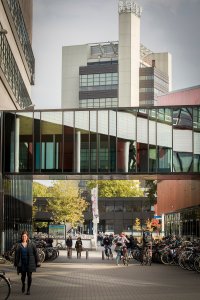
Differential equations
As the shattered glass is swept up, the first-years set to work themselves. Today this means deriving differential equations. Students consult each other busily, scribbling on squared paper, while someone hurriedly looks up Newton’s second law on Wikipedia. In amongst the Dutch students there are students from China, Romania, Spain, India and other countries. Most of them explicitly chose an English-taught programme. ‘English is the language of science,’ says Patrick Weske from Germany. ‘I couldn’t see the use of first learning everything in German, only to have to learn it all again in English later.’
But many international students come simply because they want to get the best possible education. Silvi Bundo from Albania hopes a degree from the Netherlands will improve her future prospects. She also looked at the options in the US and the UK but she felt they were too far away. ‘And tuition costs were much higher there.’
Once the students have derived their equations, lecturer Loes Segerink explains the next assignment. Segerink is completely at ease speaking English and fires questions into the room. She gets a ‘volunteer’ to write solutions on the board.
International classroom
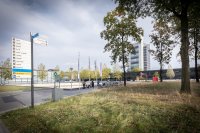
The aim is for students of the ‘new’ programme in Electrical engineering not just to learn all about the subject, but also to benefit from the mix of nationalities which the English-language programme attracts. Segerink: ‘They encounter more cultural differences now.’ Which helps them learn skills that will stand them in good stead on the job market.
But a truly international classroom does not happen by itself. It is important, for example, that teachers make sure all the project groups include several international students. And a course on intercultural sensitivity was introduced this year. This is no optional extra, says Segerink, since everyone comes up against some of the everyday frictions that go with cultural differences. Foreign students can be startled, for example, by the typical Dutch directness. And there are differences in how seriously people take their studies. Segerink notices that Asian students put more pressure on themselves to be high achievers. They work much longer hours and are sometimes crippled by the fear of making mistakes. ‘Some of them see it as a real honour to study here. Dutch students who consider it an honour to study Electrical engineering are more unusual.’
Global citizens
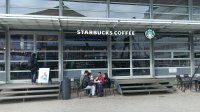
The UT sees the international classroom as the big advantage of English-taught Bachelor’s programmes. In its latest internationalization strategy, the university states that it aims to educate ‘global citizens’. By this it means graduates equipped for the international labour market, who can build a machine not just in the Netherlands but also working in a diverse team abroad. This ambition is in evidence when you walk around the Enschede campus – known as the setting of Dutch author Peter Buwalda’s bestseller Bonita Avenue. An Indonesian woman wearing a headscarf cycles past, Chinese is being spoken outside Starbucks, and the smokers’ corner is animated by a discussion in Italian.
All quite familiar to WUR of course, where Master’s programmes already attract a lot of foreign students, making the campus here at least as international as the one in Enschede. But this could be reinforced by introducing English-taught Bachelor’s programmes, which could also offer Bachelor’s students an international classroom. This is mentioned in the advisory report on international Bachelors’ submitted to the executive board last summer by a committee led by Harry Bitter, professor of Biobased chemistry and technology. But the question is, warns the chair of Twente University Council Herbert Wormeester, whether this is a realistic option for all programmes.
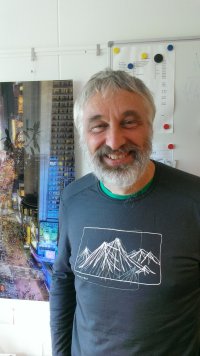
Herbert Wormeester, voorzitter Twentse Universiteitsraad
Reservations
‘Before Bachelor’s programmes switch to English they should ask themselves whether they have an international community of students,’ says Wormeester. He works on the sixth floor of the Horst complex, and has a splendid view of the green boundary of the campus from his desk. ‘You actually need 25 percent non-Dutch students,’ says Wormeester. Otherwise the reality will be that not every project group has internationals in it, or that all the students at a lecture are Dutch. ‘And that feels strange. Before you know it, everyone’s talking Dutch again.’
The Twente council has always had reservations about switching to English, says Wormeester. ‘We agreed that the request to make the switch should come from the Bachelor’s programme itself. The English language should not be imposed on them by our executive board.’ There are some programmes, says Wormeester, which simply cannot switch to English. The Technical health science programme is a case in point: its graduates qualify for registration with a Dutch association of individual health practitioners (BIG: Beroepen in de Individuele Gezondheidszorg) and have to be able to work in the Netherlands and talk to patients in Dutch.
In Wageningen too, there is an awareness that not every Bachelor’s programme is suited to a switch to English. Two programmes which have already said they are not interested are Agrontechnology and Landscape Architecture, with their Netherlands-based subject matter and case studies.
Growth
Wormeester, who is not just chair of the council but also a programme director, is very positive about the effects of the language switch on ‘his’ Bachelor’s in Advanced technology. ‘The reason my programme wanted to switch was quite simple: to boost our quality.’ Advanced technology was attracting high school graduates with lower and lower grades for mathematics and physics. They struggled to keep up on the degree programme, which led to a lot of extensions and late dropouts, says Wormeester. After switching to English the programme automatically started attracting a different kind of student. The average final grade for mathematics and physics went up by one point, and the success rate on the degree rose with it. ‘We still have just as many Dutch students, but a different category.’ And the total student numbers went up due to the influx of international students.
It is difficult to say whether a language switch always leads to more students. In Twente this varies per degree programme. The overall trend is towards growth, however, and that is a sensitive issue in Wageningen. Extra growth in student numbers due to the introduction of English-language Bachelor’s programmes would not be welcomed by everyone – to put it mildly. WUR has already grown tremendously over recent years, putting pressure on staff, funding and facilities. For the first time this academic year, evening classes are being trialled, which led to protests from students. The Bitter committee’s report on English-language Bachelor’s does not see growth as a goal, and says ‘excessive growth’ is a worry for many programme directors. The report also says that programmes which have already introduced or applied for a cap on recruitment – Nutrition and health, Biotechnology and Molecular life sciences – do not want to switch to English.
Talent
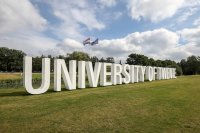
An Indian student comes into Wormeester’s office to get a signature. The programme director responds with enthusiasm and encourages him: ‘Tell us about why you need a visa.’ It turns out the lad will be going to Australia soon, where he gets to talk at a conference about the accelerometer – a piece of equipment that measures acceleration – which he and his fellow students built. He was the best student in his year, says Wormeester after the lad has gone. ‘That’s been a foreign student for the last four years.’ Which just goes to show, says Wormeester, that the English-language Bachelor’s programmes are attracting foreign talent to Enschede.
Wormeester is also convinced that foreign students who come to the Netherlands for their Bachelor’s degrees integrate more easily than they can when they only come as Master’s students. It is true that they come in with different cultures and knowledge and language levels, but the students are still blank pages, relatively speaking: they all want to make friends and they explore university life together. Integration works pretty well in Advanced technology, says Wormeester, pointing out the poster for Astatine study association hanging in his office. ‘This year they have a board member from outside Europe for the first time.’ The association has adopted English as the language of communication too, and seeks to get Dutch and international students actively mingling.
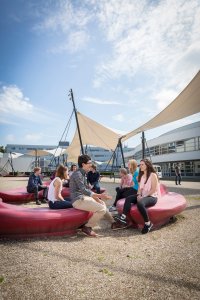
Secondary school English
Meanwhile the lecture for the Electrical Engineering first-years is coming to an end. Half the students leave while they rest finish a last assignment. The Dutch students in this group manage fine with their secondary school English, says Segerink. Concerns about that have proven unfounded. ‘But,’ the teacher adds, gesturing towards the board full of mathematical formulas and to the shattered jar, ‘How much English is there here?’ On programmes which do not have mathematics as their lingua franca, she suspects more subtleties get lost. ‘Take psychology or literature. There it’s a matter of expressing yourself very precisely.’ She has had discussions about this with colleagues at the UT, and she thinks it is a risk which Wageningen should give some thought to. ‘Because even if you have lived abroad for years, you can still express yourself best in your mother tongue.’
English-taught Bachelor’s degrees in Wageningen
The executive board at Wageningen University & Research wants six Wageningen Bachelor’s programmes to switch to English from the academic year of 2018-2019. These are Biology; Forest & nature management; Soil, water and atmosphere; International land and water management; Environmental sciences; and Food technology. If the plan goes ahead – it is still pending approval by the WUR council – seven of the nineteen Wageningen BSc programmes will be taught in English. The Tourism degree programme is already taught in English.
More than English
The vision on internationalization at the University of Twente (UT) goes beyond the introduction of English in Bachelor’s programmes. The aim is to makes these programmes truly international, with international issues reflected in the curriculum. The university also aims at 25 percent international students in every year. This is essential to creating the kind of international classroom the university wants, in which students can learn from cultural differences. The Bachelor’s students are also encouraged to get experience abroad. Moreover, the university hopes to attract more international researchers and to ensure that Dutch staff go on more international exchanges. Finally, English is also increasingly used as the language of communication outside the classroom too.
Practical challenges
The Electrical engineering BSc programme at the University of Twente (UT) went over to English five years ago. One of the practical challenges here was to establish a good admissions procedure. It is important to have a selection procedure to ensure that students come in with an adequate command of English, enough subject knowledge and realistic expectations of their time at university. A second challenge was to get all written materials translated. Textbooks were already in English but readers, regulations, minutes and publicity materials were not yet. Teachers were faced with the task of translating all their lecture material into English. This was an especially big job for experienced teachers who already had a lot of material. One advantage was that international staff could now teach on Bachelor’s courses as well as supervise theses.

